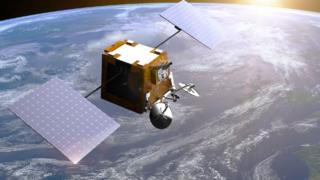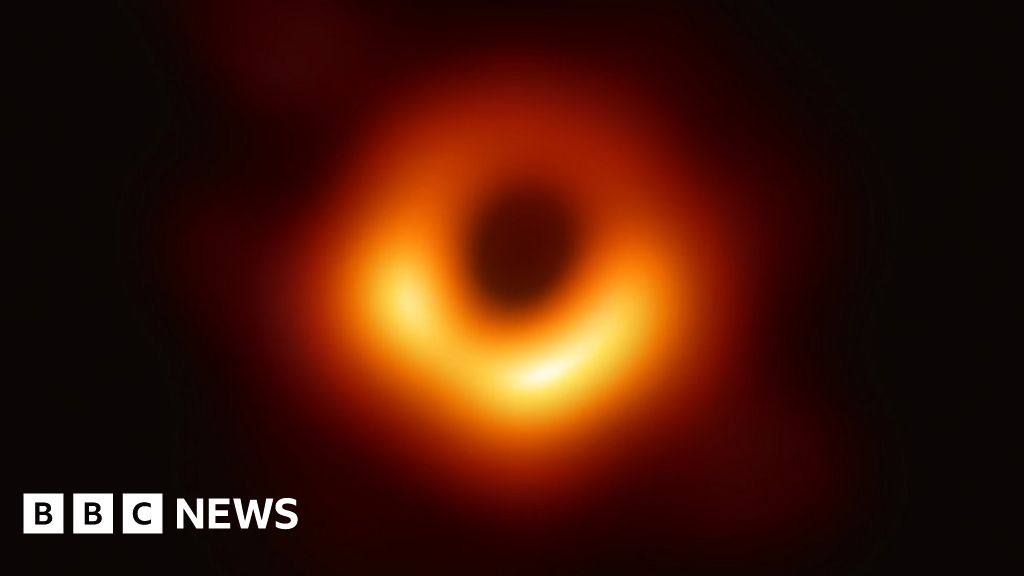 Image copyright
ONEWEB
Image caption
Artwork: Bharti and the UK government are each putting in $0.5bn (£400m)
Image copyright
ONEWEB
Image caption
Artwork: Bharti and the UK government are each putting in $0.5bn (£400m)
The sale of the failed satellite company OneWeb to Bharti Global Ltd of India and the UK government has been approved by a US bankruptcy court.
The two parties' joint bid of $1bn secures them the ailing firm's assets.
It means OneWeb will soon be able to resume building a space network capable of delivering internet connections to all parts of the globe.
Ministers hope the resurrected firm can also transmit navigation signals as an alternative to the EU's Galileo system.
Britain walked away from involvement in the European project when it ceased to be a Union member state in January.
Friday's hearing, held under the auspices of the US Bankruptcy Court for the Southern District of New York, was a key procedural moment in OneWeb's efforts to restore itself to financial health after running out of funds in March this year.
The company issued a statement in which it said: "The parties will work to complete the plan sale process, including filing our plan and disclosure statements with the court, conducting voting with our creditors, and seeking regulatory approval and completing customary closing conditions, and expect the process to be completed by the fourth quarter of 2020."
Image copyright ONEWEB Image caption The OneWeb HQ in west London has a control room to monitor and command satellitesOneWeb, which has its HQ in west London and parallel operations in Virginia, US, still has considerable challenges in front of it.
The rescue plan presented to the New York court on Friday only provides about $640m to take the business forward - after various settlement costs are taking into consideration.
Prior to seeking bankruptcy protection, the company had launched 74 satellites for a designed constellation of 648.
Manufacturing the remaining spacecraft and getting them all into orbit on a string of rockets will require additional investment that's been estimated by independent analysts to be in the region of at least $2bn. New commercial partners will therefore be needed.
The UK government's interest in OneWeb became public knowledge at the end of June. The merits of getting involved have attracted both support and criticism, with some describing the intervention as bold and others decrying what they believe will turn out to be a lost investment.
So far, ministers have revealed little of their intentions for OneWeb, although Business Secretary Alok Sharma told MPs this week that using the company's constellation for satellite navigation was not its prime consideration.
The greater motivation to back OneWeb, he said, came from a desire to see improved access to broadband internet in remote areas, and, in strategic terms, to raise the ambitions of the UK in space.
"I think there's been debate around (a) Global Navigation Satellite Service (GNSS), and that wasn't the rationale for this particular investment. But of course, we are exploring how OneWeb... may be able to contribute to Positioning, Navigation and Timing (PNT) resilience in the future," he explained during questions from the Business, Energy and Industrial Strategy Committee of the House of Commons.
Image copyright OneWeb Image caption Artwork: The government says its principal interest is broadband connectivityEyebrows have been raised about the prospect of using OneWeb for satellite navigation. The company's planned constellation was designed with a very different purpose in mind and adapting it to take on this further role will not be straightforward.
But there is growing interest in doing PNT at lower altitudes than is traditionally the case with GNSS systems like Galileo and the Americans' GPS network, whose spacecraft fly at over 20,000km altitude.
OneWeb's spacecraft operate at 1,200km and sat-nav signals transmitted from this height would potentially be stronger and more robust against efforts to jam or interfere with them.
Xona Space Systems is a US start-up that has received funding from the British space-specialist venture-capital operation Seraphim.
Xona plans a 300-strong small satellite constellation to do precise navigation and timing from low-Earth orbit.
The company's CTO Tyler Reid told BBC News this week that its patent pending technology was aiming to achieve centimetre-level accuracies - the sort performance that will be needed by self-driving cars.
"Autonomous systems are reliant on precise location. To do that job and to do it well you really need to know your position down to the level of the paint on the road," he said.
"The width of the paint on the road is 10cm and that's really the level of the interaction of these vehicles."
Jonathan.Amos-INTERNET@bbc.co.uk and follow me on Twitter: @BBCAmos

 5 years ago
746
5 years ago
746 

